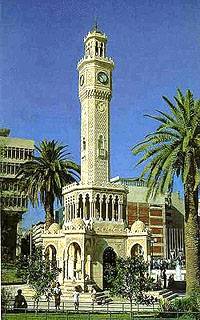|
Izmir:
The third largest city of Turkey is also in Aegean region
which used to have the ancient name Smyrna, an Amazon
woman warrior, grows wheat, barley, potatoes, cotton,
tobacco, olives, grapes and figs. It is located in the
west central Turkey on the Aegean Sea at the eastern of
Izmir Gulf. Except from the Agora,
the ancient Aqueducts
and the Museum of Archeology,
Izmir is not rich in archeological remains. Smyrna was
also one of the Seven Churches of Revelation. It is 90km
to Kusadasi.

Izmir
Sardis:
One of the other ancient cities in the region is Sart (Sardis) which used to be a political and cultural center
of Anatolia. It was the capital of Lydia. It was also one
of the Seven Churches of
Revelation. The ruins in Sardis that are worth
seeing are the Synagogue
which used to be a part of gymnasium, the Gymnasium
was a complex of symmetrically arranged rooms and the Temple
of Artemis which was one of the largest ancient
temples.
Priene:
The last three ancient cities in the region are Priene,
Miletos and Didyma. To begin with Priene, it was an
ancient harbor city which had to change its location
because of the alluviums the Meander River carried. It is 35km
away from Kusadasi. The city was founded by the
inhabitants of an abandoned Ionian city that had the same
name. The city was assigned by Alexander the Great to
watch the unreliable city Miletos. Among the ruins that
are worth seeing are the Theatre
which had the capacity to hold 5000 people was one of the
finest theatres of Hellenistic Kingdom and although it was
rebuilt in the Roman period it still remained as a typical
Hellenistic theatre, the Bouleterion
which was used for the meetings of the town council, the Prytaneion
was the seat of the elected city administration in the
east of the bouleterion and the Temple
of Athena Polias which was the temple dedicated
to the goddess of Priene, Athena Polias, to protect the
city.
Miletos:
Miletos, near the village Akkoy, had the fame because of
its location on trade routes. In the ancient city,
the Theatre which was
a small hellenistic theatre that had the capacity of 5300
people, Byzantine Fortress
which is located at the top of the theatre hill is thought
to be built mostly with the stones of the theatre, Harbor
Monuments, the Delphinium
which was a Hellenistic outdoors shrine, the Bouleterion
which consisted of a propylon, courtyard and auditorium,
the Nymphaeum facing
the bouleterion had three stories with statues of gods,
the South Agora, the North Gate which was destroyed during
the construction of the Mosque Ilyas bey, the Temple
of Serapis between the south agora and the
Faustina Baths, the Baths of
Faustina which were built by Faustina in the
2nd century AD, the Ilyas Bey
Mosque which was built in the 15th century by
the ottoman Military Commander Ilyas Bey and the
Caravansary.
Didyma:
And lastly Didyma which meant twins as being the meeting
place of Zeus and Leto for their twins Apollo and Artemis.
It is 75km to
Kusadasi. The city had the fame to be a prophecy center
which was dedicated to Apollo. In the ancient city the
most important ruin is the Temple
of Apollo which was an unusual temple not only
because of its huge size but also for its antechamber
Cresmographeion.
The Anatolia
had been home to many ancient cities and civilizations.
Briefly Aegean Region consists of the cities above. For
further information you can click on the names of the
ancient cities.
<<<BACK
|
